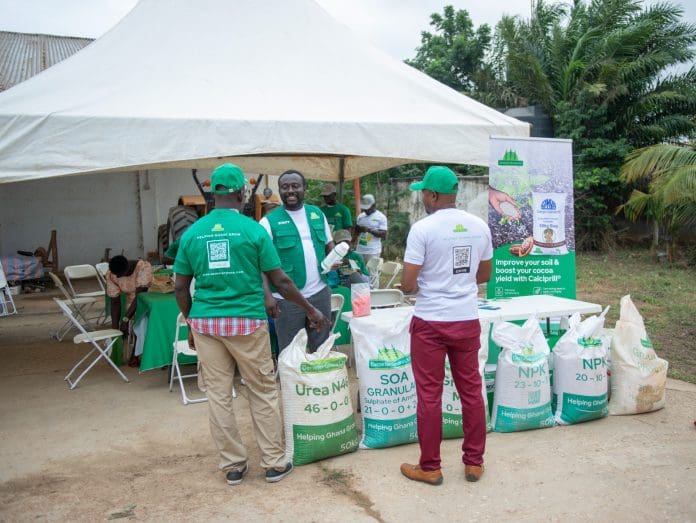
By: Eyram Annan-Wuaku, Head of Marketing, Demeter Ghana Limited
Across the country’s farmlands, a quiet crisis unfolds every planting season. Farmers work tirelessly, invest in fertiliser, and still record underwhelming yields. The culprit is not effort, nor even access — it’s how fertilisers are applied. Decades of blanket recommendations have trained farmers to treat all soils and crops as the same, leading to inefficiency, nutrient imbalance, and lost profit potential.
In today’s agriculture, fertiliser selection is no longer a routine decision — it’s a strategic business move. Every bag of fertiliser is a financial decision that determines not only yield, but also the long-term health of the soil. Yet too often, fertiliser choice is made by habit or hearsay, not by evidence.
The truth is straightforward: not all fertilisers are created equal, and none work universally. Ghana’s soils are as diverse as its farmers — from the clay-rich fields of the north to the sandy loams along the coast. Each crop, from maize to cocoa to vegetables, has unique nutritional demands at different stages of growth. Fertiliser that boosts one farm’s output can hinder another’s.
For many smallholder farmers, the choice often boils down to NPK 15-15-15 or 20-10-10 — a decision made more out of convenience than agronomic need. But this guesswork has a cost. With the right soil data and crop insights, farmers can match nutrient solutions precisely to their field conditions — improving yields, reducing waste, and protecting their soil.
That’s where companies like Demeter Ghana Limited are helping to shift the narrative. The company’s range of crop-specific fertilisers and soil-improvement products, from Asaase Hene (Polysulphate), OMEX, Calciprill to balanced NPK formulations, are designed to respond to local soil realities, not override them.
More importantly, Demeter Ghana invests heavily in farmer training and soil testing support, ensuring that knowledge accompanies every product sold. The goal isn’t just higher yields, but smarter yields where every cedi spent works harder for the farmer.
Matching fertiliser to crop and climate
Different crops draw from the soil in different ways. Maize, a heavy nitrogen feeder, demands targeted nutrition during its vegetative stages, while legumes such as beans rely more on phosphorus and potassium to support nodulation. The most profitable approach customises product selection and timing to each crop’s growth pattern — for example, applying a balanced fertiliser at planting, a nitrogen-rich top-dress mid-season, and micronutrient supplements toward grain fill.
Some progressive farmers are already pairing inorganic fertilisers with soil conditioners that rebuild organic matter. This integrated approach supports immediate productivity while enhancing long-term fertility, a win for both profits and sustainability.
The Economics of Fertiliser Use
The cheapest fertiliser is rarely the most profitable. True value lies not in the cost per bag, but in the yield and quality it produces. A well-formulated fertiliser with high nutrient availability might appear costlier, but its efficiency and lower application requirement often make it more economical over time.
Farmers who shift their mindset from “price per bag” to “return per acre” see the difference almost immediately. That’s the economics that matter, not what fertiliser costs, but what it earns.
Soil Health as the Foundation of Profitability
The most sustainable farms treat fertiliser as an investment in soil health. Healthy soils, rich in organic matter and microbial activity, retain nutrients better and respond more efficiently to fertiliser. That’s why practices such as crop rotation, mulching, and the use of organic amendments are no longer optional extras; they are business imperatives for long-term profitability.
Fertilisers and soil care are not opposing ideas, they are partners in resilience. A farmer who builds soil health today reduces dependency on external inputs tomorrow.
From guesswork to smart work
Ghana’s next agricultural leap depends on data-informed, locally adapted fertiliser use. That means testing soils, learning the science behind crops, and seeking professional guidance when selecting products. The transition requires effort, but the payoff is undeniable: higher yields, better-quality crops, healthier soils, and stronger bottom lines.
Farmers deserve more than a one-size-fits-all approach. With the right tools, insight, and support — from companies committed to sustainable productivity like Demeter Ghana, they can finally turn every bag of fertiliser into a strategic investment, not a gamble.
Because the future of Ghanaian agriculture won’t be defined by how much we grow, but by how intelligently we grow it.
